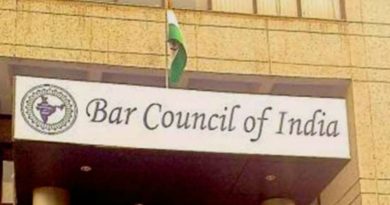From Enrolment to Expulsion: BCI Exposes Collusion in Delhi Bar Council Over Fake Degree
(Judicial Quest News Network)
New Delhi, November 19: In a stern move aimed at safeguarding the integrity of the legal profession, the Bar Council of India (BCI) has ordered the immediate removal of a Delhi-based advocate, J. Vasanthan, after it was found that he had secured enrolment using a fabricated law degree. The apex regulatory body described the matter as an “exceptional case” of collusion involving touts, intermediaries, and insiders within the Bar Council of Delhi (BCD).
“The Sub Committee has recorded its serious concern that the facts disclosed may indicate an organized criminal network involving touts, intermediaries and insiders facilitating illegal enrolments on the basis of forged educational qualifications. The Committee has specifically noted that this may not be an isolated incident and that the possibility of similar illegal enrolments in the past by the same persons cannot be ruled out, particularly as Mr. Jagdish has been an employee of the Bar Council of Delhi for more than two decades.”
Fake Credentials Exposed
The case originated when the Bar Council of Delhi referred the matter to the BCI under the proviso to Section 26(1) of the Advocates Act, 1961. Following verification, Bundelkhand University, Jhansi, in its communication dated June 26, 2025, categorically confirmed that the LL.B. degree and marksheets submitted by Vasanthan were not genuine. This revelation prompted the BCD to escalate the issue to the national council for disciplinary action.
“In view of these grave concerns, the Special Committee of the Bar Council of Delhi has, in its meeting held yesterday, removed Mr. Jagdish from service. He had been continuing as an employee of the Bar Council of Delhi on extension after his superannuation in 2024. His removal is without prejudice to any further civil, criminal or disciplinary proceedings that may be initiated against him in accordance with law.”
Advocate’s Admission of Collusion
Despite being served with a show cause notice, Vasanthan initially failed to provide any explanation. However, in a subsequent reply dated November 12, 2025, he admitted that his enrolment had been facilitated through intermediaries or touts upon payment of money. He further confessed that fabricated academic documents were used to secure his entry into the profession. In a startling disclosure, he alleged the involvement of private individuals and even a staff member of the Bar Council of Delhi in the fraudulent process.
“Accordingly, the Bar Council of India has directed the Bar Council of Delhi to (a) Conduct an immediate, comprehensive and time bound inquiry into all suspicious or irregular enrolments, including those in which the above named individuals or any other staff members, intermediaries or touts may have been involved in the past (b) Identify and proceed against all persons involved, including intermediaries and brokers, as well as any staff of the Bar Council of Delhi or other insiders who may be found complicit, and to initiate appropriate disciplinary and other legal proceedings against them and (c) issue notices and take appropriate action against the two advocates who issued the moral character certificate in this case, after following due process, in order to ascertain their role and fix responsibility, if any, for facilitating an enrolment based on forged documents.”
BCI’s Strong Observations
Taking cognizance of the gravity of the matter, the BCI ordered Vasanthan’s immediate removal from the rolls of advocates. The Council underscored that such fraudulent practices strike at the very root of the profession’s credibility and cannot be tolerated. By flagging the collusion within the Delhi Bar Council, the BCI signalled its intent to cleanse the system of malpractices and restore public confidence in the legal fraternity.
Legal and Institutional Implications
The case highlights systemic vulnerabilities in the enrolment process and raises serious questions about internal safeguards within state bar councils. The BCI’s intervention under Section 26(1) of the Advocates Act demonstrates its resolve to exercise supervisory powers where state councils fail to prevent misconduct. The Council’s strong language in describing the case as “exceptional” suggests that further scrutiny of enrolment procedures may follow, with possible reforms to curb the influence of touts and intermediaries.
A Warning to the Profession
Legal experts view the ruling as a cautionary tale for the profession, emphasizing that fraudulent entry into the bar not only undermines the sanctity of legal education but also erodes public trust in the justice system. The BCI’s action is expected to serve as a deterrent against similar attempts and may trigger wider investigations into enrolment irregularities across state councils.
This development marks one of the rare instances where the BCI has directly intervened to strike off an advocate for fraudulent enrolment, setting a precedent for strict enforcement of professional standards.



